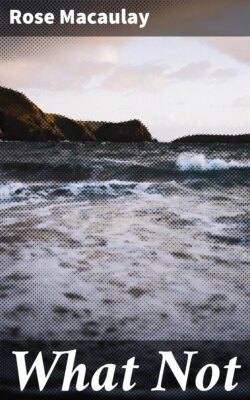Читать книгу What Not - Macaulay Rose - Страница 5
На сайте Литреса книга снята с продажи.
1
ОглавлениеAfter the Great War (but I do not say how long after), when the tumult and the shouting had died, and those who were left of the captains and the kings had gone either home or to those obscure abodes selected for them by their more successful fellows (to allay anxiety, I hasten to mention that three one-time Emperors were among those thus relegated to distance and obscurity), and humanity, released from its long torment, peered nervously into a future darkly divined (nervously, and yet curiously, like a man long sick who has just begun to get about again and cannot yet make anything coherent of the strange, disquieting, terrifying, yet enchanting jumble which breaks upon his restored consciousness)—while these things happened, the trains still ran through the Bakerloo tube, carrying people to their day's work.
Compartments in tube trains are full of variety and life—more so than in trains above ground, being more congested, and having straps, also no class snobbery. Swaying on adjacent straps were a fluffy typist, reading "The Love He Could Not Buy," in the Daily Mirror, a spruce young civil servant on his way to the Foreign Office, reading The Times, a clergyman reading the Challenge, who looked as if he was interested in the Life and Liberty movement, another clergyman reading the Guardian, who looked as if he wasn't, an elderly gentleman reading the Morning Post, who looked patriotic but soured, as if he had volunteered for National Service during the Great War and had found it disappointing, a young man reading the Post-War, the alert new daily, and a citizen with a law-abiding face very properly perusing the Hidden Hand. The Hidden Hand was the Government daily paper. Such a paper had for long been needed; it is difficult to understand why it was not started long ago. All other papers are so unreliable, so tiresome; a government must have one paper on which it can depend for unfailing support. So here was the Hidden Hand, and its readers had no excuse for ignorance of what the government desired them to think about its own actions.
The carriage was full of men and women going to their places of business. There were tired young men, lame young men, pale and scarred young men, brown and fit young men, bored and blasé young men, jolly and amused young men, and nearly all, however brown or fit or pale or languid or jolly or bored, bore a peculiar and unmistakable impress stamped, faintly or deeply, on their faces, their eyes, their carriage, the set of their shoulders.
There were, among the business men and girls, women going shopping, impassive, without newspapers, gazing at the clothes of others, taking in their cost, their cut, their colour. This is an engrossing occupation. Those who practise it sit quite still, without a stir, a twinkle, a yawn, or a paper, and merely look, all over, up and down, from shoes to hat.... They are a strange and wonderful race of beings, these gazing women; one cannot see into their minds, or beyond their roving eyes. They bear less than any other section of the community the stamp of public events. The representatives of the type in the Bakerloo this morning did not carry any apparent impress of the Great War. It would take something more than a great war, something more even than a food crisis, to leave its mark on these sphinx-like and immobile countenances. Kingdoms may rise and fall, nations may reel in the death-grapple, but they sit gazing still, and their minds, amid the rocking chaos, may be imagined to be framing some such thoughts as these: "Those are nice shoes. I wonder if they're the ones Swan and Edgar have at 30s. She's trimmed her hat herself, and not well. That skirt is last year's shape. That's a smart coat. Dear me, what stockings; you'd think anyone would be ashamed."
These women had not the air of reckless anticipation, of being alert for any happening, however queer, that, in differing degrees, marked the majority of people in these days. For that, in many, seemed the prevailing note; a series of events so surprising as to kill surprise, of disasters so appalling as to numb horror, had come and gone, leaving behind them this reckless touch, and with it a kind of greed, a determination to snatch whatever might be from life before it tumbled again into chaos. They had not been devoid of lessons in what moralists call Making the Best of It, those staggering years when everything had fallen and fallen, successively and simultaneously, civilisation, and governments, and hopes, and crowns, and nations, and soldiers, and rain, and tears, and bombs, and buildings, only not prices, or newspapers.
For, if everything had so fallen once, it might even now be riding for a fall again (in spite of the League of Nations and other devices for propping up the unsteady framework of a lasting peace). The thing was to get what one could first. The thing, in the opinion of one traveller in that train, was to wear cap and bells, to dance through life to a barrel organ, to defeat a foolish universe with its own weapons.
And always there was that sense in the background of a possible great disaster, of dancing on the world's thin crust that had broken once and let one through, and might break again. Its very thinness, its very fragility added a desperate gaiety to the dance.
